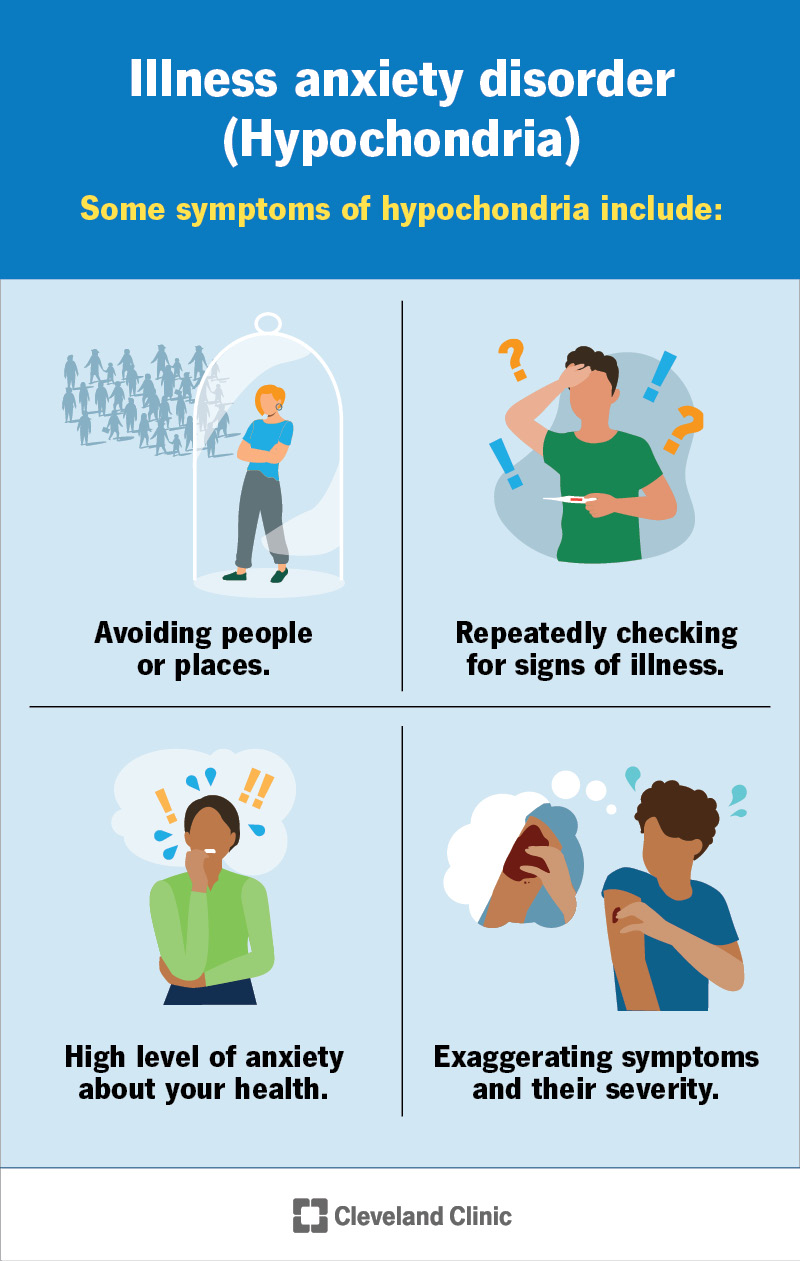Illness anxiety disorder is a chronic mental illness sometimes known as hypochondria. People with this disorder have a persistent fear that they have a serious or life-threatening illness despite few or no symptoms. Medications and mental health therapy can help.
Advertisement
Cleveland Clinic is a non-profit academic medical center. Advertising on our site helps support our mission. We do not endorse non-Cleveland Clinic products or services. Policy
People with illness anxiety disorder, sometimes known as hypochondria or hypochondriasis, fear that they have a serious medical condition or that they’re at high risk of becoming ill. They may also misinterpret typical body functions as signs of illness.
Advertisement
Cleveland Clinic is a non-profit academic medical center. Advertising on our site helps support our mission. We do not endorse non-Cleveland Clinic products or services. Policy
To medical professionals, these fears might look unjustified or unrealistic because there’s no supporting evidence that the provider can find. But for people with illness anxiety disorder, their fears are very real to them. It’s not something they can control.
Even after medical tests show no problems, people with hypochondriasis have trouble focusing on anything other than worrying about being very sick. Their persistent health worries can interfere with their relationships, careers and lives. You may be more familiar with the term hypochondria or health anxiety. Healthcare providers now use the term illness anxiety disorder.
Some people with illness anxiety disorder may actually have a diagnosed physical illness. But because of illness anxiety disorder, you may feel your condition is more severe than it is.
Someone with illness anxiety disorder generally fits into one of these categories:
Advertisement
Illness anxiety disorder (hypochondria) is extremely rare. It affects about 0.1% of people in the U.S. It typically appears during early adulthood.

Image content: This image is available to view online.
View image online (https://my.clevelandclinic.org/-/scassets/images/org/health/articles/9886-illness-anxiety-disorder-hypochondria-hypochondriasis)
If you have illness anxiety disorder, you have an ongoing but unrealistic fear about being seriously ill. The specific illness(es) that you worry about often changes.
Symptoms of hypochondria include:
Healthcare experts don’t know why some people develop illness anxiety disorder. You may be more prone to illness anxiety disorder if you have a family history of:
Constant fear and worry can cause stress that impacts your physical and mental well-being. Illness anxiety disorder can disrupt your relationships and life. You may miss out on time with loved ones because you’re concerned about your health. Illness anxiety disorder also puts you at risk for:
Some people feel severely depressed and may even think or act on thoughts of self-harm or suicide. If you have any thoughts about hurting yourself, call or text the Suicide & Crisis Lifeline at 988.
To diagnose illness anxiety disorder, healthcare providers refer to the criteria listed in the American Psychiatric Association’s Diagnostic and Statistical Manual of Mental Health Disorders, 5th edition (often known simply as the DSM-5. Your provider may make a diagnosis or they may refer you to a behavioral health specialist, like a psychologist or psychiatrist. The six criteria for illness anxiety disorder include:
Advertisement
A persistent fear about having a serious illness or developing one is the top symptoms of illness anxiety disorder. Your provider may diagnose illness anxiety disorder if you have health anxiety (or other illness anxiety disorder symptoms) for six months or longer even after tests show that you’re not sick.
Your healthcare provider may partner with a mental health professional, like a psychologist or psychiatrist, to help you treat hypochondria. But you’ll also continue to receive regular care from your provider.
Treatment goals focus on improving quality of life by minimizing symptoms. Illness anxiety disorder treatment includes:
Illness anxiety disorder is a chronic (ongoing) condition. You may go through periods where you have little or no health anxiety — and then it returns. You can take steps to keep illness anxiety disorder symptoms in check.
Unfortunately, there’s no known prevention against illness anxiety disorder. But getting support from medical and mental health professionals and loved ones (family, friends, etc.) may help reduce the severity of your symptoms and help you cope with the disorder.
Advertisement
You might consider seeing a provider if you or others notice signs of illness anxiety disorder. You should call your healthcare provider if you experience depression, anxiety or other mood changes.
If you’re experiencing suicidal thoughts, call or text the Suicide and Crisis Lifeline at 988. This national network of local crisis centers provides 24/7 free, confidential support to people who are feeling emotional distress or having thoughts of self-harm or suicide.
You may want to ask your healthcare provider:
Someone with somatic symptom disorder may obsess and worry about their health — just like someone with illness anxiety disorder. A person with somatic symptom disorder has true physical symptoms. But those symptoms could be normal sensations from how your body works, or medical tests may not be able to pinpoint a cause for the physical symptoms.
Everyone worries about their health from time to time. But if health anxiety affects your ability to enjoy life, you should talk honestly with your healthcare provider. Your provider can diagnose and treat illness anxiety disorder. Living with illness anxiety disorder can be challenging, but you can learn coping skills to help you enjoy good health again.
Advertisement

Sign up for our Health Essentials emails for expert guidance on nutrition, fitness, sleep, skin care and more.
Learn more about the Health Library and our editorial process.
Cleveland Clinic’s health articles are based on evidence-backed information and review by medical professionals to ensure accuracy, reliability and up-to-date clinical standards.
Cleveland Clinic’s health articles are based on evidence-backed information and review by medical professionals to ensure accuracy, reliability and up-to-date clinical standards.
Anxiety disorders can affect your life in many ways. Cleveland Clinic mental health experts can help you manage anxiety so you’re back in control.
